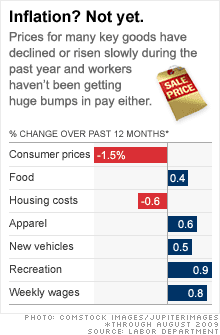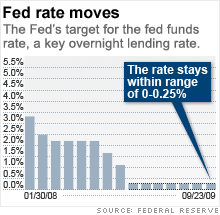Whip inflation later?
The Fed risks an inflation nightmare by keeping interest rates low indefinitely. But some economists think that's a problem that can be dealt with next year.



NEW YORK (CNNMoney.com) -- The Federal Reserve is going to keep interest rates near zero for the foreseeable future. That much is certain.
What isn't so clear is whether this will create an inflation headache down the road for the Fed -- and consumers.
So far, inflation is not a problem. According to the most recent figures from the Labor Department, overall consumer prices have decreased during the past 12 months. Core consumer prices, which exclude the costs of food and energy items, are up just 1.4% over the past year.
What's more, there's no evidence of inflation in the labor market. Many economists argue that inflation is only an issue when the economy is humming along. That's because unemployment tends to be low, workers are getting steady pay increases and companies can afford to raise prices as a result.
But the unemployment rate is at a quarter-century high. Average weekly wages are up only slightly from a year ago, according to the Labor Department. Many companies have cut back the number of hours their employees work in response to weak demand and a need to keep costs down.
With all that in mind, it's no surprise that the Fed reiterated Wednesday that it "expects that inflation will remain subdued for some time."
"Anybody in the market right now that says they are worried about inflation fears are just looking for something to be scared about. You really have to dig for that. It wasn't that long ago that the scare was lower prices," said Terry Clower, director of Center for Economic Research and Development at the University of North Texas.
But there are some troubling signs.
Gold has rallied above $1,000 an ounce and many experts think that this is partly due to fears that the Fed's money-printing campaign over the past year will cause the dollar to weaken even further than it already has.
That's putting upward pressure on other commodities. Oil is trading around $71.50 a barrel, an increase of about 20% over the past six months. The prices of sugar and copper have shot up recently as well.
Even though this bull run in commodities can be partly written off to speculation, it would be unwise to completely dismiss inflation as a longer-term economic concern.
Sooner or later, the trillions of dollars that the Fed has injected into the economy through various lending initiatives and its quantitative easing -- i.e. buying mortgage-backed securities and Treasurys in order to keep long-term rates low -- could lead to rising prices.
"The Fed has printed a lot of money and unless Milton Friedman was wrong, when you print money inflation is going to be a problem," said John Norris, managing director of wealth management with Oakworth Capital Bank in Birmingham, Ala., in reference to the late Nobel Prize-winning economist and free market champion.
Norris conceded that inflation should not be the Fed's biggest concern right now, but he said that the Fed must have a game plan to start raising interest rates and unwind its numerous liquidity programs by the middle of next year.
"With inflation numbers as low as they are now, the Fed has some breathing room," he said. "But you can't keep the overnight lending rate at zero and the yield curve this steep and not have some asset bubble up. We saw it with the tech bubble and housing bubble. If you're not worried about inflation, then I think you are a fool."
Clower, while not concerned about inflation now, also thinks the central bank shouldn't wait too long to raise rates. He said the massive government spending could eventually lead to "insidious inflation." As such, he pointed out that, as counterintuitive as this may sound, a rate hike could actually inspire more confidence in the Fed.
Federal Reserve Chairman Ben Bernanke said last week that he thought the recession is "very likely over." So if he really believes that, then what better way to prove it than by backing up words with action?
"You don't want to raise rates too early," Clower said. "But you almost have to wonder if the Fed could show more confidence in the economy with a small increase in rates. That would be a definitive statement that they think a recovery is under way."
Still, some think that it is extremely premature to consider a rate hike..
"Inflation concerns are nowhere in the picture. The economy is still in terrible shape. The Fed should be in no hurry to raise interest rates," said Zach Pandl, an economist with Nomura Securities in New York. He said the Fed probably isn't going to raise rates until the first quarter of 2011.
Douglas Burtnick, an investment manager with the U.S. equity team at Aberdeen Asset Management in Philadelphia, added that the economy is still in the bottoming process. With the recovery so tenuous, the bigger risk is an economic backslide, not runaway inflation.
"The Fed doesn't want to have a stutter-start recovery to the economy. I know people are extremely concerned about inflation down the road and see risks, but we're not seeing wild upticks in demand that would precede dramatic inflation," Burtnick said.
Talkback: How much longer should the Fed leave interest rates near zero? Share your comments below. ![]()

